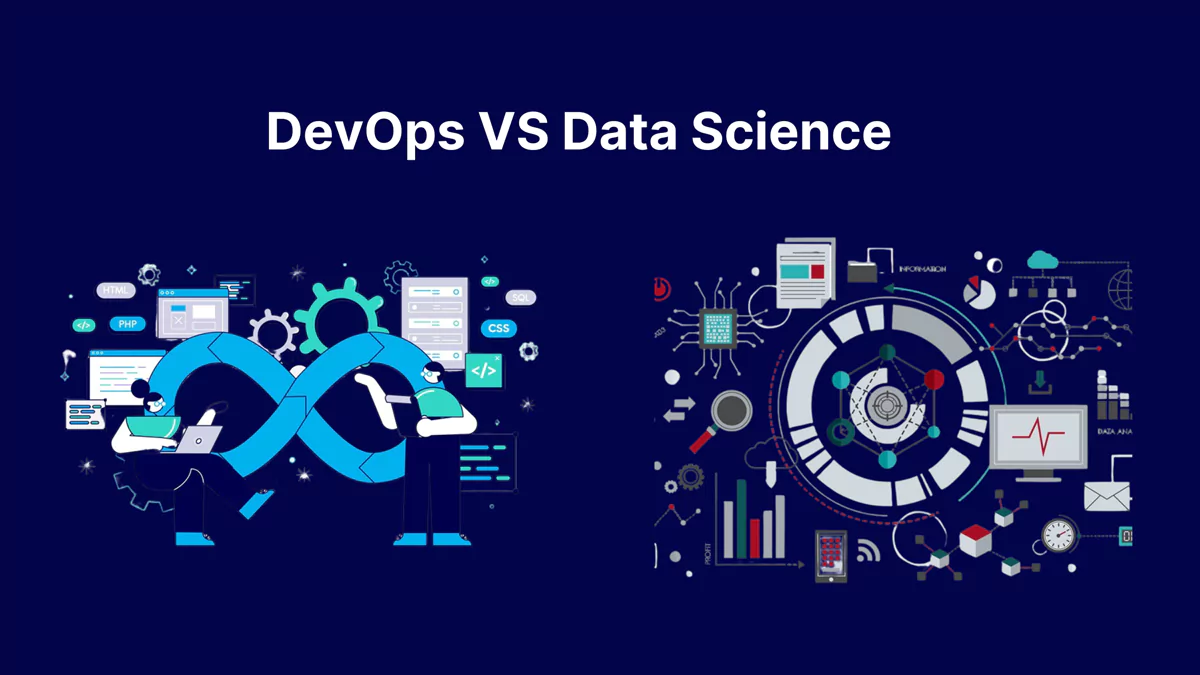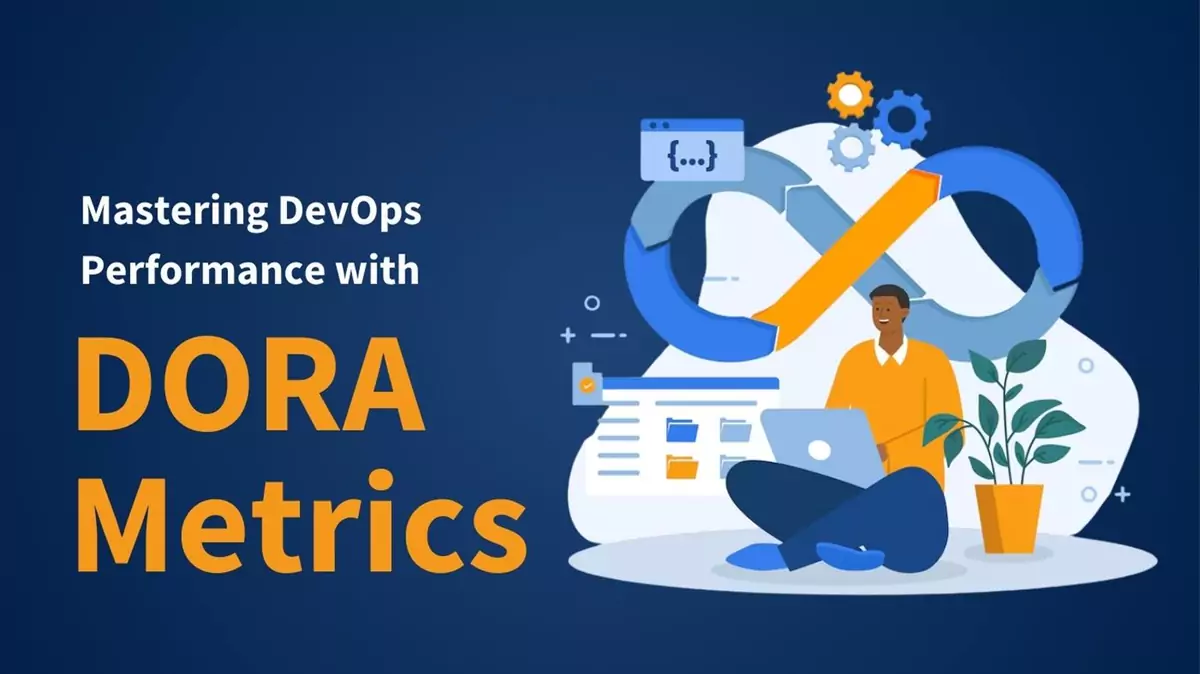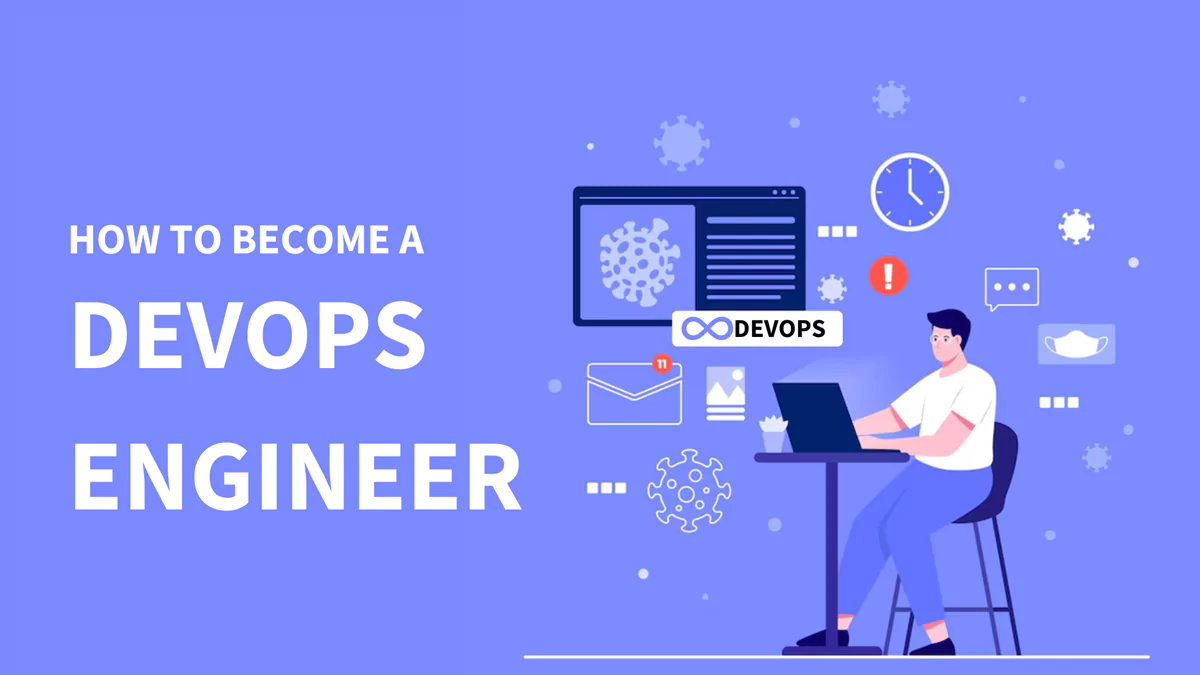Two of the hottest fields in technology, DevOps vs Data Science serve very different purposes. While DevOps is all about collaboration, automation, and integration to optimize software delivery and IT operations majorly solving the issues between Development and Operations Teams, data science deploys statistical and analytical methods to arrive at insights from data. These two disciplines are very complementary. Organizations are increasing their need to build effective data pipelines and infrastructure to support data science initiatives.
On this agenda, understanding the differences in DevOps vs Data Science roles, skills, and tools can help IT leaders optimize their teams and processes to facilitate data-driven decision-making. With the rise of automation and big data, DevOps and data science have become two of the leading career paths in tech. Both of them offer immense growth potential to technology aspirants. DevOps provides faster career revamp to those with coding and operations experience. Data science aligns best with analytical thinkers who have a steeper learning curve. Choosing between the two fields becomes a challenge.
DevOps Overview
DevOps is a method that has evolved from the experience and best practice of the management of development, testing, and support processes in a software development project life cycle. These practices help organizations in managing development, tool deployment, integrated testing, and assistance with increased productivity and speed. At the same time, they bring the critical components of continuous integration and continuous deployment to the sole responsibility of the DevOps engineer. Due to the significant benefits, many organizations are either offering their employees a safe DevOps course or instructing them to undergo one to implement these practices into their daily routine.
Traditionally, the development, testing, and support departments worked in silos, creating process gaps and conflict in duties as different people managed these functions. Such barriers were the significant causes of misunderstandings, miscommunication, and conflict in prioritization and were proven detrimental to productivity, resulting in customer dissatisfaction. DevOps’s evolution as an approach and a DevOps engineer job profile have tried to close these gaps to a great extent.
Who is a DevOps Engineer?
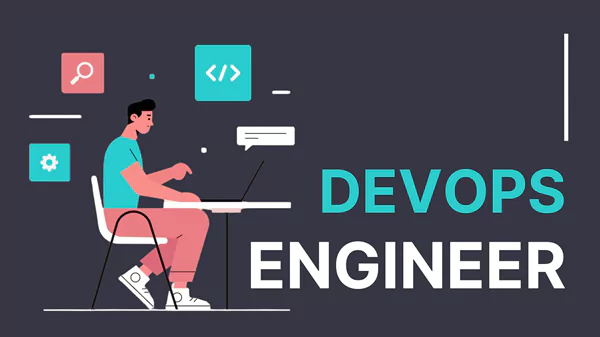
DevOps Engineers maintain the IT infrastructure of the company running smoothly. They work with the developers to deploy and manage code changes and work with an operations staff to ensure a smooth run of the system. A good DevOps engineer needs a deep understanding of both development and operations processes and also an excellent technical background.
Being a DevOps engineer is becoming increasingly important as the world becomes increasingly reliant on technology in its business aspects. Companies seek people who will make sure to streamline operations to maximize the use of their IT infrastructure. A career in DevOps engineering is a perfect opportunity for someone with a sound technical background but also a keen desire to work with both development and operations staff.
DevOps Engineers Job Description, Roles, and Responsibilities
A DevOps engineer is responsible for making sure an organization’s IT infrastructure runs well. They collaborate effectively with developers to put out code updates and with operations personnel to make sure everything runs as it should. This role requires the candidate to have a strong technical background and a deep understanding of development and operational procedures. To fulfill the technical and managerial obligations and provide complete client satisfaction, a DevOps engineer requires outstanding communication and coordination skills.
Some of the core responsibilities of a DevOps Engineer are:
- Understanding project KPIs and client requirements.
- Different IT infrastructures, automation, testing, and development tools.
- Procedures on development, testing, releasing, updating, and maintaining DevOps operations.
- Required technical expertise that will assist one in checking, verifying, and validating the code developed for the project.
- Diagnose and fix errors in the code.
- Track processes for compliance across their whole lifecycle and update or implement new procedures to maximize efficiency and minimize wastage.
- Automate and develop procedures where possible.
- Identifying vulnerabilities, implementing cyber security solutions by periodically managing risks, and carrying out vulnerability assessments.
Qualification Needs to Become a DevOps Engineer
Technical know-how during development and management and maintenance abilities in operations are some of the prerequisites for a career as a DevOps Engineer. Graduates in computer science or computer technology gain some of the technical skills required to become a DevOps engineer. However, the majority of the skills required for operations management are learned from experience or through specific development courses, which can further assist in the development of a career in the selected path. The skills required for a DevOps Engineer role involve:
- Experience with Linux-based infrastructure.
- Fluency in Java, Perl, Python, and Ruby.
- Knowledge of database setup and management, including Mongo and MySQL.
- Good troubleshooting skills.
- Excellent knowledge of most tools, cloud services, and open-source technologies.
- Familiarity with concepts such as Agile principles and DevOps.
Career Paths for DevOps Engineers
The demand for skilled engineers in DevOps has been on a rapidly increasing spree, especially as businesses switch to more practices of DevOps to speed up software delivery and improve operational efficiencies. A DevOps engineer can make or break the success of a digital transformation project by automating processes and thus opening communication between the development and operations teams. This essay explores the available career advancement prospects that DevOps engineers possess in this rapidly changing technology world.
Various Career Routes: There are many career pathways and specialization opportunities available for a DevOps engineer. Some of the specializations in view presently include cloud computing, containerization, infrastructure automation, continuous integration/continuous deployment, security, and site reliability engineering. This is just naming a few of those specializations provided to DevOps engineers. DevOps engineers can make a distinctive career path through their hobbies and professional goals by polishing talents in those particular fields.
Roles of Leadership: DevOps engineers often progress to management roles—DevOps manager, DevOps architect, or team lead—where they have to lead strategic thinking, manage and orchestrate DevOps efforts, and lay down the DevOps processes and culture across a company. Leadership roles allow mentoring and training of younger team members, influence organizational change and have a significant impact on important innovation.
Cloud Computing: Cloud computing solutions are becoming quite widespread in DevOps setups. Experienced DevOps engineers who are well-versed in cloud platforms such as Google Cloud Platform, Microsoft Azure, and Amazon Web Services, among others, are in great demand by companies looking to modernize their infrastructure and use fully cloud-native architectures. There are a lot of choices for the specialization of DevOps engineers in serverless computing, cloud migration, infrastructure as code, and cloud-native development.
Toolchain for DevOps: DevOps professionals pick, implement, and maintain these many tools and technologies that compose the toolchain of DevOps. Specializing in popular DevOps tools such as Prometheus, Terraform, Jenkins, Git, Docker, Kubernetes, and Terraform can lead to specialization and career growth.
Counseling and Entrepreneurship: From the entrepreneurial and innovative DevOps engineers, one can get started with their own business and business venture or even turn to consulting. The scope for the entrepreneurs is things like SaaS for the needs of DevOps, DevOps tools, cloud migration services, and consultancy. DevOps engineers can exercise free will and subsequently tackle some hard problems and especially impact the industry if they have a deviation towards a startup.
Salary of a DevOps Engineer
As the number of businesses progressively move to DevOps principals, the demand for DevOps professionals is increasing, and thus the pay scale grows positively for this industry. In this section, we will explain the nuances of the pay scales of a DevOps Engineer in India, considering the influence of geography and experience. There are different factors affecting the salary range for DevOps engineers in India. Generally, the DevOps engineers paid in India are within the range of INR 6 lakhs to 15 lakhs per annum.
The entry-level DevOps engineers salary in India having 0–2 years of experience generally get average annual salaries of around INR 4 to 8 lakhs. Entry-level professionals need to have some familiarity with DevOps procedures and resources.
The mid-level group includes professionals who have two to five years of experience with DevOps. A mid-level DevOps engineer can expect an average of INR 8 to 15 lakhs per year.
DevOps engineers who have worked for more than five years are considered experienced. Experienced DevOps workers can earn more than INR 15 lakhs per year, depending on their skill level and the complexity of the projects they have worked on.
What is a Data Science?
Data science is an amalgamation of cross-disciplinary occupations that takes advantage of domain knowledge, computer skills, and statistical expertise in deriving information and findings from both structured and unstructured data. It is often described by scientific data analysis and interpretation processes, systems, algorithms, and approaches. The ultimate goal of data science is to turn data into sense-making insights, projections, and recommendations that guide human decision-making.
Data science is an extensive area of study with ample applications. It encompasses, but is not confined to, artificial intelligence, machine learning, data visualization, and analytics. Data science finds its application in many areas, including marketing, technology, finance, healthcare, and technology.
Who is a Data Scientist and What Do They Do?
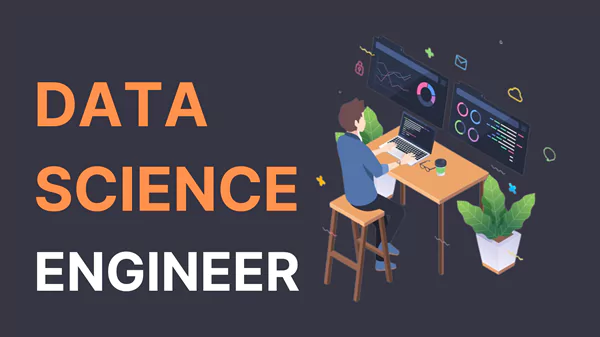
In today’s data-driven world, data scientists are the modern-day investigators, entrusted with revealing hidden patterns and insights from huge amounts of data. They are the ones who turn raw data into actionable knowledge, thereby enabling organizations to make decisions more effectively, enjoy greater efficiencies, and enjoy a competitive advantage. A data scientist’s profession encompasses all technical skills, domain knowledge, and soft skills. They are responsible for collecting and cleaning data, doing data analysis and interpretation, creating predictive models, visualizing data, and sharing the findings with stakeholders.
The Major Phases of the Data Science Lifecycle are as Follows:
Understanding of Business: The first step in the process is identifying a business opportunity or problem that the data science project addresses. Understanding the stakeholders of the project, corporate goals, and possible influences would be required in-depth.
Data Interpretation: The data scientists at this stage explore and gather information from various sources—about real-time data streams, external datasets, and internal databases. They ensure the data’s consistency, relevance, and quality.
Data Preparation: The data must be cleaned, transformed, and prepared for analysis. Data may be encoded with categories, the treatment of missing values, and the removal of outliers.
Interaction and Translation: They can easily communicate the results and insights that data scientists have discovered to both technical and non-technical audiences. As a result, they make use of illustrations and also narrative strategies to convey complex data concepts in simple and succinct forms.
Skills Need to Become a Data Scientist?
1. Beginning with the Fundamentals: Database + Programming Language
Everything is useless if you don’t know how to program because you can’t do any tasks that would allow you to gain understanding. Because of this, working in the field of data science would necessitate having some familiarity with specific programming languages to handle data and implement sets of algorithms as needed. But data scientists also employ a few major languages, and most importantly, the recruiter would want you to speak these languages. The list of programming languages is as follows: SQL, Scala, Python, and R Programming.
2. Mathematics
This is an important subject to consider if you want to work in this industry. It is expected that one will possess a solid command of statistics and mathematics to complete tasks and execute for the intended output. some of the list of subjects you must learn to become proficient in your role as a data scientist are-Linear Algebra and Statistics Matrix
- Calculus of Geometry
- Regression Dimensionality Reduction Probability Distribution
- Vector Schemas
3. Analysis and Visualization of Data
Working on data visualization is necessary for data scientists to make charts and graphs that are visually understandable. There are many tools we can use; some of them are- Tableau, PowerBI, D3.Js, etc.
4. Internet Data Mining
Any data that is available online can be collected as needed. Businesses utilize this technique to extract important information from text, photos, videos, and other types of media to increase productivity and creativity. Customer evaluations, polls, surveys, etc., can also contain details. Under legal restrictions, businesses of all sizes are actively employing this strategy, which can be made simpler by processing massive amounts of data when specific tools and software are used. Web scraping has become extremely popular among data scientists in an era where data is everything.
5. Artificial Intelligence and Machine Learning
You must have a good knowledge of artificial intelligence and machine learning. Any data scientist will be able to work and solve complicated problems, especially those that are meant for predictions or goal-setting. Anybody with these abilities will be undoubtedly recognized as a skilled expert. There are two key techniques in AI and ML, and they are:
- Supervised machine learning is a method of predicting future outcomes for unanticipated data using labeled training datasets.
- Unsupervised machine learning is a type of machine learning that trains on an unlabeled dataset and operates independently, i.e. without supervision.
6. Big Data
Those who have worked with big data know that managing such a large amount of data is not viable due to numerous limits (both physical and computational) and that addressing such issues necessitates the use of specialized tools and techniques. Some of these include:
- KNIME creates specialized sets of data by matching designs and procedures.
- RapidMiner is an automated tool for data mining that includes a visual workflow.
- Integrate.io is used for processing, and preparing data sets for cloud analytics.
- Hadoop is an open-source framework for storing and processing enormous amounts of data, which can range from gigabytes to petabytes.
In-Demand Career Paths in Data Science
- Data scientist: Data scientists must be able to examine vast amounts of complex raw and processed data to identify patterns that benefit an organization and guide its strategic business decisions. Data scientists are far more technically advanced than data analysts.
- Machine learning engineers: Machine learning engineers are usually responsible for building machine learning systems. To develop software solutions, they need to have very good programming and statistical skills. They are also referred to as research engineers or research scientists.
- Data Architect: Make sure analytics apps are designed for numerous platforms and that data solutions are optimized for performance. Apart from designing novel database systems, data architects frequently devise strategies to enhance the efficiency and capabilities of pre-existing systems, while also striving to facilitate accessibility for database administrators and analysts.
- Data Engineers: Analyze collected and saved data in real-time or in batches. To provide a strong and linked data ecosystem inside a company and enable data scientists to access information, data engineers are also in charge of developing and maintaining data pipelines.
- Data Analysts: Transform and manipulate massive data volumes to provide the necessary insights for businesses. For many businesses, this function may also include monitoring site analytics and evaluating A/B testing. Data analysts also help with decision-making by creating reports for organizational leaders that effectively explain the trends and insights found in their investigation.
Salary of a Data Scientist in India
The average annual salary of a data scientist ranges between INR 7,00,000 and INR 9,00,000. However, the salary always varies because of various factors such as experience, location, industry, etc.
Entry-level data scientists can expect from two to three years of experience. Generally, recent graduates or professionals who have been in any other field and changed to an analytics, machine learning, or data science role will have appropriate degrees or certifications. For an entry-level data scientist, the expected range is between INR 3,00,000 and INR 7,00,000 per year. People who come from elite schools or have extraordinary talents may be paid more.
Mid-level data scientists have gained experience and know-how to work on a more complex set of tasks. Experienced professionals with 3 to 5 years of experience can expect to draw remuneration between INR 8,00,000 and INR 15,00,000 per annum. This range can be higher in technology companies and for people with niche expertise in the areas of AI, machine learning, or big data technologies.
Advanced Data Scientists: The specialist professionals work on hard-knock experience areas, such as artificial intelligence, deep learning, or big data architecture. They are usually the leaders of data science teams, develop procedures in data modeling, and actively participate in strategic decisions. The expert professionals may earn between INR 16,00,000 and INR 30,00,000 depending upon their experience, leadership roles, and the impact they make in the company.
A Comparison Table of DevOps Vs Data Science
| Aspect | DevOps | Data Science |
|---|---|---|
| Focus | Optimizing software delivery and IT operations | Deriving insights from structured and unstructured data |
| Primary Goal | Streamlining operations, collaboration, automation | Extracting actionable insights, predictive modeling |
| Main Activities | Deployment, code management, system maintenance | Data analysis, modeling, visualization |
| Required Skills | Technical proficiency, collaboration, automation | Programming (SQL, Python, R), statistics, machine learning |
| Career Paths | Cloud computing, automation, leadership roles | Data Scientist, Machine Learning Engineer, Data Analyst |
| Tools and Technologies | Jenkins, Docker, Kubernetes, AWS, Terraform | Python, R, SQL, TensorFlow, Tableau, Hadoop |
| Salary Range (India) | INR 4-8 lakhs per annum (entry-level) | INR 3-7 lakhs per annum (entry-level) |
DevOps VS Data Science: Which one to choose?
When deciding between DevOps and data science, consider your abilities and hobbies. Both provide rewarding work, substantial career advancement, and competitive salaries. DevOps is best suited to those who prefer hands-on engineering, have prior operational expertise, and want to facilitate rapid software innovation. Data science is ideal for technicians with analytical skills who enjoy extracting insights from complicated data sources and articulating those results to drive change. By assessing your soft skills, technical abilities, interests, and job preferences, you may choose whether DevOps or data science is the greatest fit for the next stage in your career. With careful skill development and networking, you’ll be well on your way to success in one of these rapidly changing areas.
